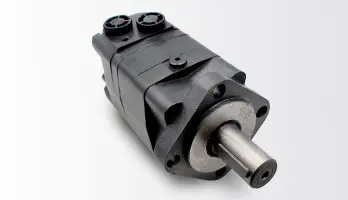
What are Hydraulic Pumps?
Hydraulic pumps operate by creating a flow of fluid that transfers energy to various components in a hydraulic system. The pressurized fluid is then used to drive hydraulic motors, cylinders, and other actuators, which perform mechanical tasks like lifting, pushing, and rotating. The efficiency and reliability of a hydraulic system largely depend on the quality and performance of its pump.
Hydraulic Motors and Their Role

Hydraulic motors are closely related to hydraulic pumps and are essential in converting hydraulic energy back into mechanical energy. While pumps push the fluid to create flow, hydraulic motors use the pressure of that fluid to produce rotational force and motion. Hydraulic motors are commonly used in applications like conveyors, winches, and construction equipment where controlled and powerful movement is required.
Low-Speed High-Torque Hydraulic Motors
One specific type of hydraulic motor that deserves attention is the low-speed high-torque (LSHT) hydraulic motor. These motors are designed to deliver high torque at low rotational speeds, making them ideal for heavy-duty applications where precise control and immense power are needed. LSHT motors are widely used in industrial machines, agricultural equipment, and heavy machinery like excavators and drilling rigs.
Hydraulic Filtration Tanks: Ensuring System Cleanliness
Maintaining the cleanliness of the hydraulic fluid is vital for the efficient operation of hydraulic systems. This is where hydraulic filtration tanks come into play. Filtration tanks help to remove contaminants and debris from the hydraulic fluid, ensuring that it remains clean and free of particles that could damage sensitive components like pumps, motors, and valves. Clean hydraulic fluid not only prolongs the lifespan of hydraulic parts but also enhances the overall performance and efficiency of the system.
Importance of Filtration in Hydraulic Systems
Improves Component Life: By keeping the fluid clean, filtration tanks reduce wear and tear on components, extending their lifespan.
Prevents System Failures: Contaminated fluid can lead to blockages, increased friction, and ultimately system failure. Effective filtration prevents these issues.
Enhances Efficiency: Cleaner fluid ensures that all hydraulic parts operate at their optimal levels, improving system efficiency and reducing energy costs.
Hydraulic Parts and Spare Parts

Hydraulic systems consist of numerous components, each playing a critical role in the overall operation. Hydraulic parts include pumps, motors, valves, hoses, cylinders, and other elements that work together to create a powerful and controlled system. To ensure smooth and uninterrupted operation, it's essential to have access to quality hydraulic spare parts.
Importance of Using Quality Hydraulic Spare Parts
Minimizes Downtime: Having readily available spare parts reduces downtime when repairs or replacements are needed, keeping the equipment running efficiently.
Compatibility and Performance: Using high-quality spare parts ensures compatibility with the existing system, maintaining optimal performance and reliability.
Cost-Effective Maintenance: Investing in genuine spare parts can reduce long-term maintenance costs by preventing frequent breakdowns and extending the lifespan of the equipment.
Choosing the Right Hydraulic Pump for Your System
Selecting the correct hydraulic pump is crucial for the efficiency and functionality of the system. When choosing a pump, consider factors such as the type of application, required flow rate, pressure capacity, and compatibility with other hydraulic components like motors and filtration tanks. A well-chosen pump not only enhances system performance but also ensures energy-efficient operation.
Types of Hydraulic Pumps
Gear Pumps: Simple and reliable, often used in low-pressure applications.
Piston Pumps: Ideal for high-pressure systems with high efficiency.
Vane Pumps: Suitable for medium-pressure applications with smooth operation.
Conclusion
Hydraulic pumps are at the heart of hydraulic systems, providing the essential flow and pressure needed to drive machinery and equipment. Understanding the relationship between hydraulic pumps, motors, filtration tanks, and spare parts is crucial for maintaining an efficient and reliable hydraulic system. Low-speed high-torque hydraulic motors, in particular, offer excellent performance for applications that require controlled and powerful movement at low speeds.
To ensure your hydraulic system runs smoothly, it's essential to invest in high-quality components and spare parts. Regular maintenance, including the use of hydraulic filtration tanks, will help to keep your system free of contaminants and extend the lifespan of its parts. Whether you need pumps, motors, or spare parts, selecting reliable and durable products will lead to more efficient operations and reduced downtime in your hydraulic-powered applications.
Check this video: